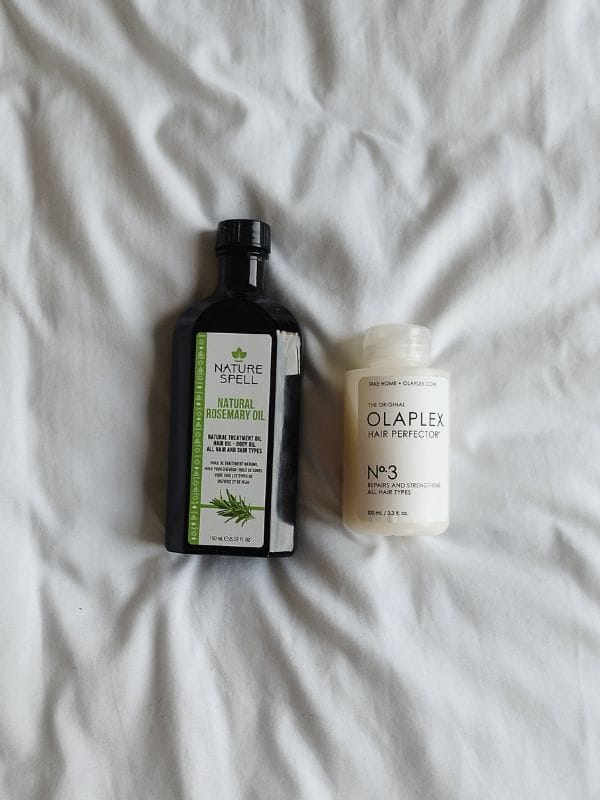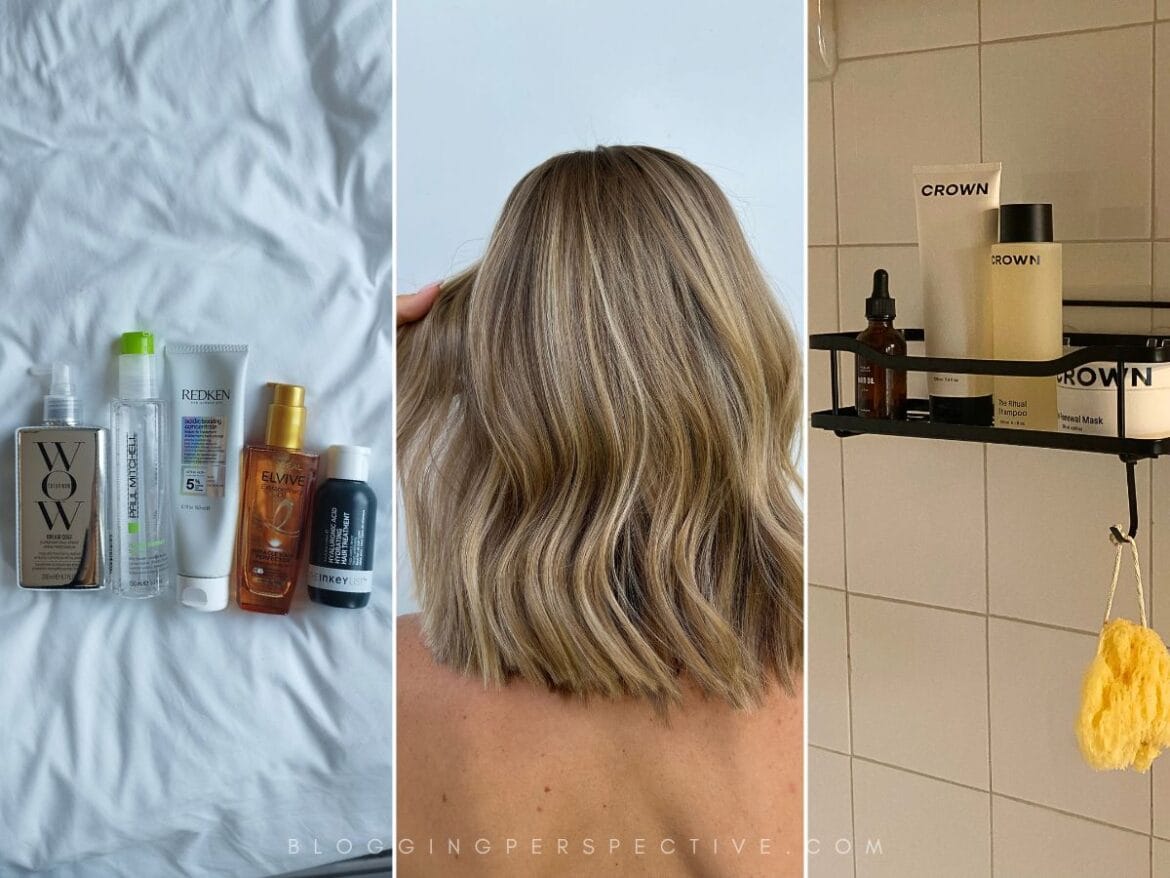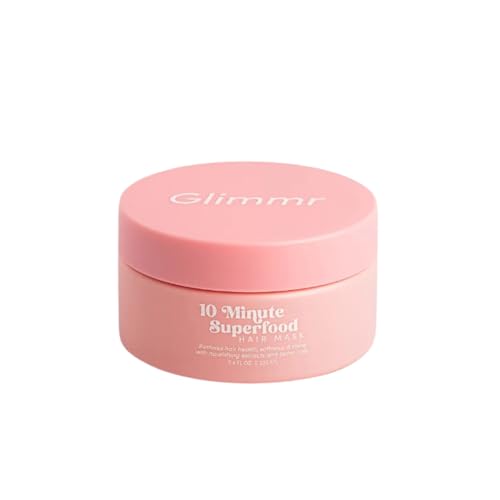Let’s be honest—everyone wants hair that feels healthy and looks amazing. But great hair doesn’t just happen overnight (sadly).
The secret? A simple but consistent routine. Whether you’re dealing with frizz, split ends, or just trying to keep things under control, taking a little extra care goes a long way.
In this guide, we’ll break down all the essentials to help you keep your hair strong, shiny, and totally envy-worthy. Let’s get to it!
Pin for later:

Use a pre-shampoo treatment

A pre-shampoo treatment can be a real game-changer for your hair.
Bonding treatments can literally help your hair transform over time, especially if you struggle with dull or damaged hair.
Another pre-shampoo treatment you can try is natural oils, such as rosemary oil which is said to be great for hair growth.
Just massage some oil into your roots and then across the whole hair length. Leave it on for at least 20 minutes, or even overnight if you feel like it.
Then, wash it out and continue with the rest of the routine.
Regularly Wash Your Hair

The whole ‘less washing is better’ thing is a myth, people!
Shampooing your hair is the foundation of a good hair care routine. So don’t be afraid to do as often as your hair needs it!
How often you should wash your hair depends on your hair type and lifestyle. For most people, washing every two days is reasonable. But then some have oilier scalps – if that’s you, there is nothing wrong with washing your hair daily.
And also if you’re on the opposite end of the spectrum and your hair doesn’t get greasy until day 3, then wash every 3 days.
It all depends on your hair and lifestyle as well – for example, if you exercise daily and your hair gets greasy faster, then take that into account and wash your hair more often.
You don’t get brownie points for washing your hair as little as possible.
Apply Conditioner

After shampooing, always always ALWAYS apply conditioner.
This is an essential step to moisturize, detangle, and restore some of that moisture in your hair.
Focus on the mid-lengths to the ends of your hair, as these areas are more prone to dryness and damage.
Leave the conditioner on for a few minutes before rinsing thoroughly.
this is the perfect time to shave your legs or do something else, while your hair is being pampered.
Scalp Care

Now, let’s talk about your scalp. If you want those locks looking fab, you’ve gotta keep the roots happy!
Make time for regular scalp massages (tip: do it after applying the conditioner!). It’s not just relaxing, but it also gets the blood flowing and helps spread those natural oils that make your hair shiny and strong.
Once a month, grab a scalp exfoliator. Say bye-bye product build-up, dead skin, and anything else messing with your scalp.
For an extra boost, treat yourself to a scalp serum or tonic. Products with ingredients like tea tree oil, peppermint, or eucalyptus give your scalp a cooling, “ahh-worthy” cleanse while reducing itchiness and flakes.
Try a lightweight formula that won’t weigh down your roots—just check labels for phrases like “clarifying” or “nourishing.
Hair Mask Once A Week

Hair masks provide that extra deep nourishment to your hair and are great to use once a week or as needed.
Look for masks with ingredients like argan oil, shea butter, or keratin to repair and strengthen your hair.
A good hair mask will take that shine and smoothness to the next level, making your hair look better with less styling effort (which can actually be damaging to your hair).
Damage-free Brushing

Avoid using fine-toothed combs, as they can cause hair breakage and damage.
Instead, opt for a wide-toothed comb or a tangle teezer, especially when your hair is wet and more susceptible to breakage.
Also, avoid brushing your hair a lot while it’s wet. Instead, use a wide tooth comb on wet hair to gently detangle, and then brush out your hair more thoroughly once it’s dry.
Leave-In Products

The secret to beautiful hair with less styling is using the right hair care products.
Are you using hair straighteners every day? Try this instead – get a good hair smoothing lotion, follow up with a smoothing serum, and then dry your hair pulling it taut with a large round brush.
You’ll be surprised how much a good hair product can help you get your hair under control. You may even ditch the hair iron altogether!
Leave-in products are also helpful if you’re trying to form beautiful curls, or just add moisture back in to your dull hair.
Try a combination of a few products, like a leave-in hair lotion and a conditioner spray or a serum.
The key is not using too much of the product, so it doesn’t look greasy on your hair. A little goes a long way.
Protect Your Hair from Heat

Limit the use of heat-styling tools – this will help SO MUCH in the big picture of things.
Heat styling can really damage your hair, causing breakage, split ends, and overall dry looking hair.
BUT, we are being realistic here. We all still want to look put together, so if you are going to use heat styling tools (hopefully, sparingly), then apply a heat protectant spray.
It will limit the damage done and help protect your hair while styling.
Dry the Right Way

Drying your hair the right way can seriously save it from damage—no more bad hair days caused by bad habits!
Start by gently patting your hair dry with a microfiber towel or an old cotton T-shirt to avoid frizz and breakage.
Before using a hair dryer, spritz on a heat protectant to shield your strands. And yes, keep the dryer at a safe distance—your scalp will thank you.
Use the right nozzle for your hair goals: a diffuser for bouncy curls or a narrow nozzle for sleek, straight vibes.
Point the airflow downward to keep things smooth and shiny.
Protect Your Hair from the Sun

Your hair needs sun protection just as your skin does! Too much sun can leave it dry, brittle, and totally parched—not cute.
When you’re heading outside, throw on a chic hat for double-duty protection (and an instant outfit upgrade).
Not a hat person? No worries.
A leave-in conditioner with built-in UV protection works wonders to shield your strands from the sun’s harsh rays.
It keeps your hair hydrated and less prone to breakage while you’re out soaking up the sunshine!
Avoid Over-processing

Chemical treatments like dyeing, bleaching, and perms? Fun, but too much of them can turn your hair into a fragile, damaged mess—and no one wants that!
Give your hair a breather between treatments to let it recover.
If you’re a hair dye devotee, consider switching to gentler, ammonia-free options or semi-permanent dyes.
And when possible, leave the heavy-duty stuff to the pros—DIY bleaching disasters are never worth it.
Treat your locks with care, and they’ll stay strong, shiny, and fabulous!
Share on Pinterest:
























